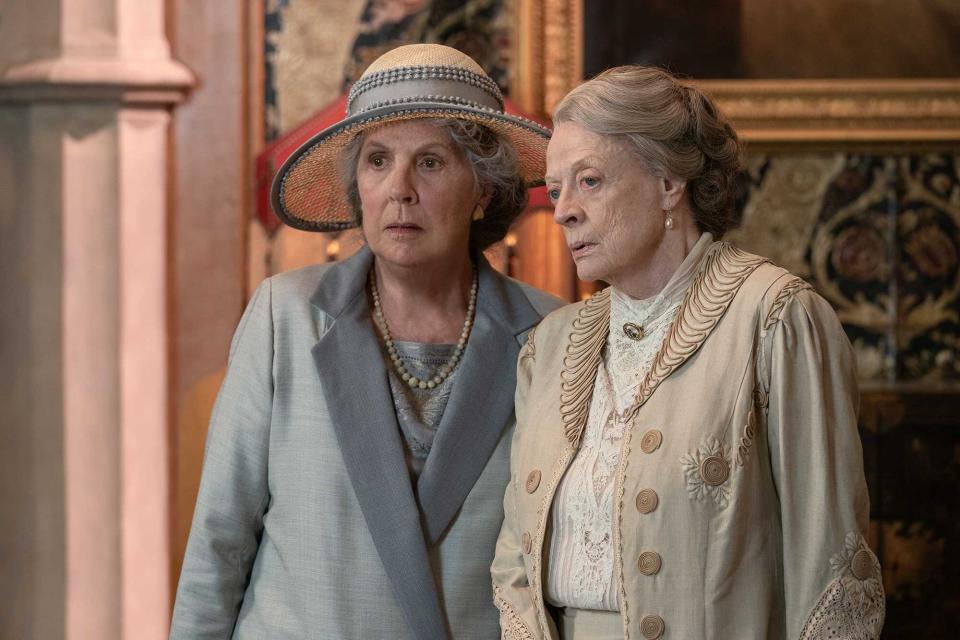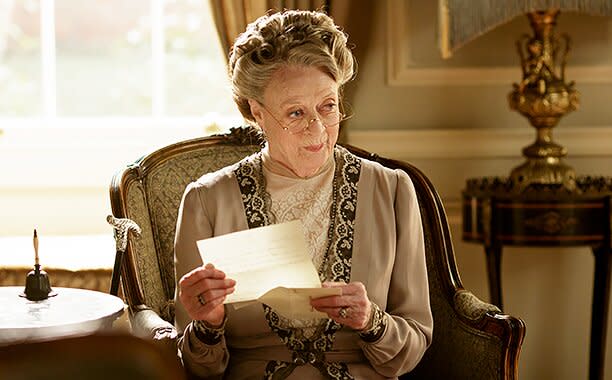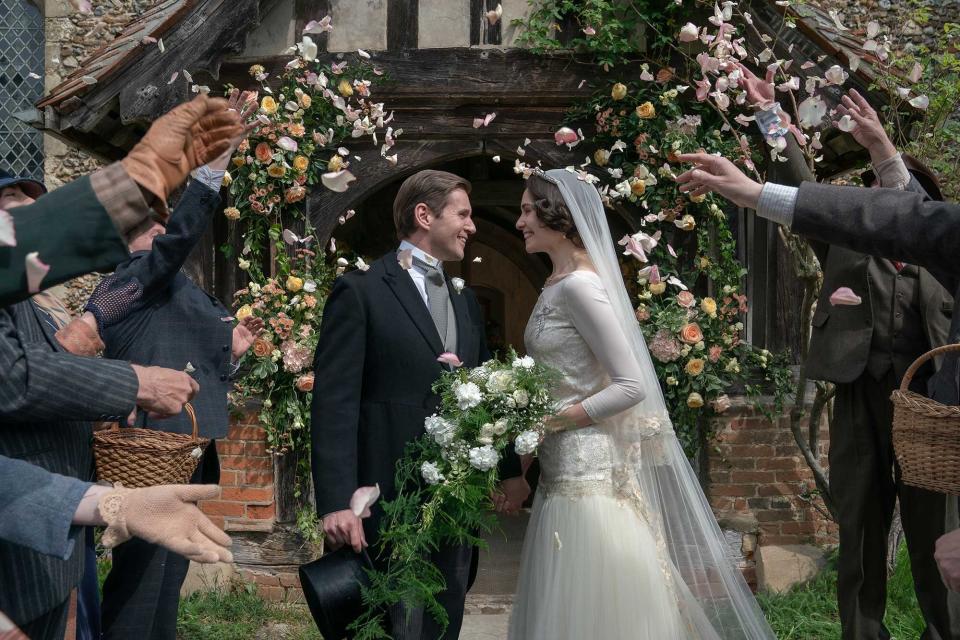All of Maggie Smith's best moments in Downton Abbey

Warning: This article contains spoilers about Downton Abbey: A New Era
Was there ever a fictional character more wry, more witty?
When Downton Abbey premiered in 2010, Violet Crawley, the Dowager Countess of Grantham (played by Dame Maggie Smith), quickly won the hearts of audiences with her biting retorts and dry way with a putdown. No one could skewer an ego or make a haughty objection quite like her.
Over six seasons and two feature films, Violet — more fondly known simply as the Dowager — softened in spite of her resistance to the inevitable forces of modernity that came to Downton and her family. She proved herself a fierce grandmother, a loyal ally, and a kindhearted citizen as some of her biggest enemies became her most beloved friends.
In Downton Abbey: A New Era, the moment has finally come when we and the entire Crawley family have to say goodbye to Violet. Though it had been speculated previously that creator Julian Fellowes would kill off Smith's character in both the TV series finale and the first film, she lived to deny such false rumors. But after revealing a terminal diagnosis at the end of the 2019's Downton Abbey, it seemed inevitable that we would now bid her farewell.
In honor of all of Violet's delicious scenes (and her treasure trove of endlessly quotable bon mots), here are Maggie Smith's most memorable moments on Downton Abbey.
"What is a weekend?"
There's a reason this is the most quoted line from Downton Abbey — even now, 10 years after it first aired. Maggie Smith delivers this delectably haughty demonstration of how out of touch the entire Crawley family is with a typical working week with such genuine confusion and derisive glee, it's unforgettable.
Violet may have been legitimately confused by middle-class Matthew (Dan Stevens) and his gauche ways, but Smith etched this pitch perfect piece of dialogue into pop culture history with ease.
Violet and Isobel

Ben Blackall / Focus Features
To be honest, we can't choose a favorite moment between Isobel (Penelope Wilton) and Violet. The relationship between these sworn enemies turned trusted confidantes remained one of the most compelling on Downton until the very end.
At first, we tuned in to watch these two women go toe-to-toe, Isobel's patience and innate sense of pragmatism bumping up against Violet's trenchant rules and regulations. Nothing was better than Isobel refusing to be cowed by Violet's words (Violet: "You are quite wonderful the way you see improvement wherever you look — I never knew such reforming zeal." Isobel: "I take that as a compliment." Violet: "I must have said it wrong.").
But as the years went on, their mutual exasperation transformed into a deep friendship, each one looking out for the other. Violet was instrumental in protecting Isobel from Lord Merton's cruel family, while Isobel honored Violet's wishes of going through her papers, as Violet took to her death bed. Even their final moments together, laced with sarcasm and genuine affection, are something we'll hold close to our hearts.
The Best Bloom Award
In the early days of Downton, the Dowager functioned mostly as a representation of the old guard and the rules the younger generation were quickly outgrowing. Plus, she was always quick with a witticism or a biting retort when a scene needed a laugh. But she started to show her capacity to evolve around season 1's Downton Village Flower Show. In years past, Violet had consistently won the Best Bloom Award (taking credit for the work of her gardener), which Isobel correctly believed was only due to intimidation. But Violet shocked everyone by giving the award to Bill Molesley, father to the servant Molesley, after seeing his crestfallen face. She might have done it only to prove Isobel wrong, but it still showed us Violet had hidden depths.
Forcing the vicar to marry William and Daisy
Violet liked to pretend she was above the daily lives of the servants, but in truth, she always held a deep affection for them (we eventually learn she used to dance with Carson at the opening of every ball). Nowhere was that more evident in her use of near-extortion to convince the local vicar to marry Daisy (Sophie McShera) and poor William (Thomas Howes) on William's deathbed. "Finally, I would point out, your living is Lord Grantham's gift," she reminds him. "Your house is on Lord Grantham's land, and the very flowers in your church are from Lord Grantham's garden. I hope it is not vulgar in me to suggest that you find some way to overcome your scruples." Well, ok, then.
Her distrust of technology
It is a truth universally acknowledged that, as we age, we inevitably look at new gadgets and gizmos with a mixture of disgust and fear. Violet was the embodiment of this, taking umbrage with everything from a phonograph to the idea of moving pictures. And it was never not hilarious. "Is this an instrument of communication or torture?" she once asked about a telephone. The verdict's still out on that one, but Smith was certainly an instrument of comedy in that scene.
Telling Matthew that Mary still loved him
Violet always pretended to keep her nose out of other people's love lives, but the truth is, she couldn't help herself. Though she initially felt Matthew was tacky and hopelessly middle-class, eventually she came to love him as a member of the family. As Matthew contemplated marriage to Lavinia (Zoe Boyle), Violet confessed that Mary (Michelle Dockery) was still in love with him, comparing Mary's reaction to news of his engagement to Juliet waking to find herself in the tomb. We love some good romantic manipulation, but Violet gets bonus points for referencing Shakespeare.
Sir Richard Carlisle
Despite Mary's interest in cocky Sir Richard Carlisle (Iain Glen), Violet was never a fan. Was there ever a better kiss-off than her retort to Carlisle's vain declaration that he was leaving than her deadpan, "Do you promise?"
Sending Tom and Sybil money

Nick Briggs/PBS
The Dowager definitely didn't approve of her youngest granddaughter falling in love with the family chauffeur (an Irish rebel at that). But once Sybil (Jessica Brown Findlay) made her choice, Violet secretly supported them, sending money so they could travel to attend Matthew and Mary's wedding. Violet then went on to suggest Tom (Allen Leech) take a more active role in running the estate after Sybil's death and bequeathed her villa in France to great-granddaughter Sybbie. For someone initially so against their union, Violet sure changed her tune.
Robert and Cora's reconciliation
Violet's relationship with her son and his American heiress wife was always a complex one, but that didn't mean she didn't want them to have a healthy relationship. When Cora (Elizabeth McGovern) blamed Robert (Hugh Bonneville) for Sybil's death, it was Violet who recruited Dr. Clarkson to explain why Sybil's death was an inevitable tragedy and no one's fault, sparking a reconciliation between the couple. Violet certainly voiced strong opinions over the years, but perhaps her most relatable position was making sure the people she loved were happy.
Giving Mary a purpose
Violet always saw a lot of herself in the younger Lady Mary: her haughtiness, her hidden romanticism, and her intelligence. So when Mary seemed a bit lost after the death of Matthew, it was Violet who pushed Mary for a position in the family that would give her a purpose. We got the sense that Violet saw in Mary a woman who might be able to have the power and influence she was never afforded in her own time. Violet recommended having Tom train Mary to be more involved in running the estate, and ultimately, it's Mary who made Downton stay financially afloat alongside her brother-in-law.
The Dowager could get it
We don't know why we ever doubted that Violet was a saucy minx in her day, but we finally got confirmation in season 5 when she revealed a former romance with Russian prince Igor Kuragin, with whom she had an affair while staying at the Winter Palace in St. Petersburg. The two planned to run off together, but Violet ultimately decided to return to her family. When we meet Kuragin many years later, it's clear Violet left a lasting impression.
Violet putting Mary in her place and helping her to get Henry back
There was never anything quite like the relationship between Violet and Mary, filled with love, approbation, admiration, and an overriding affection. But when Mary needed to be put in her place, Violet didn't hesitate — telling Mary she was in the wrong and insisting she make things right after Mary potentially ruined Edith's romantic happiness by telling Bertie about Marigold. Then, she also convinced Mary to swallow her pride and fear and figure out a way to win Henry back (Violet of season 1 would've absolutely found Henry Talbot unsuitable, so yay for growth).
Violet officially passing on Downton's legacy to Mary
Clearly we're suckers for this grandmother-granddaughter relationship, but perhaps the most poignant of their interactions came at the conclusion of the first Downton Abbey film. After pulling Mary aside at the royal ball, Violet told her about her likely terminal diagnosis, which immediately made Mary emotional. But Violet always did know the right thing to say, and she knocked it out of the park here, telling Mary she accepts her fate because she knows she is leaving Downton and its legacy in Mary's very capable hands.
Scheming to get Tom and Lucy together

Ben Blackall / Focus Features
Once upon a time, the idea of Violet scheming to get Tom anywhere but fired seemed laughable. But she came to love the former chauffeur in her own way, particularly for his care for the estate and baby Sybbie. So when he took a serious interest in Lucy (Tuppence Middleton) — also a potential way to keep a cousin's fortune in the family — Violet was ready to use all of her wiles to get them hitched.
Refusing to give up a villa
Would you give up a villa in the south of France? Us neither. And that's why we love Violet: When the rest of the family learns that a former paramour gifted Violet a villa in the South of France that she then bequeaths to Sybbie, they're shocked, particularly by the fact that she accepted such a gift from a man who wasn't her husband. But Violet knows better than to let a good thing pass her by.
Her inimitable goodbye
We hoped the moment would never come, but it did at last and she was as unforgettable, quippy, and heartfelt in death as she was in life. Weak and in her final moments, Violet still manages to get in a few winking digs in at the things and people who annoyed her before making beautiful farewells to her family that leaves every Crawley (and every member of the audience) in tears.
Related content:

 Yahoo Movies
Yahoo Movies 
